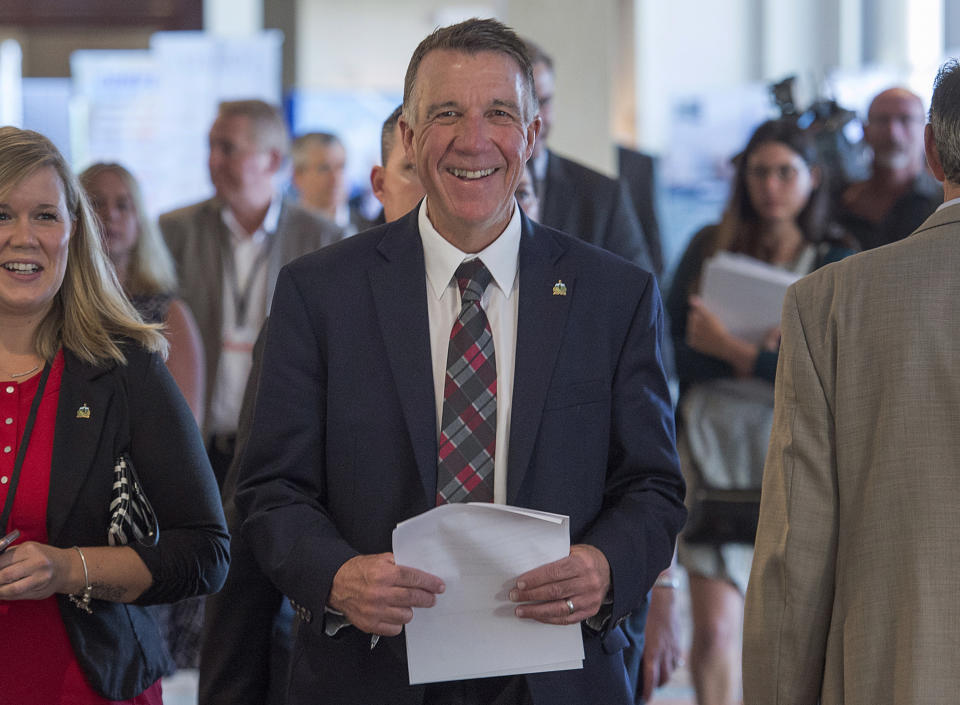Vermont governor: Canada is crucial to our economy
MONTPELIER, VT. — Canadian Foreign Minister Chrystia Freeland is in Washington on Tuesday for another round of trade talks on NAFTA as the clock runs out. Freeland and U.S. Trade Rep. Robert Lighthizer are progressing but still have unresolved issues, she said recently.
Among the many people watching the NAFTA talks closely is Vermont Gov. Phil Scott. Dealing with a demographic crisis and aging population (the second-oldest, after Maine, he laments), the state is hungry to prove it can offer good jobs to younger residents.
Scott, a socially liberal Republican running for his second term, frequently engages with businesses to pitch the small, rural state of 625,000 as a place to do business. While businesses from the west, south, and east can and do play roles in Vermont’s economy, the northern neighbors in Canada mean the most for the small state.
“Canada is incredibly important to our state — Quebec in particular,” Scott told Yahoo Finance in his office. “Quebec is our largest trading partner.”

Vermont’s trade relationship with Canada is around the $5 billion mark, according to the Governor’s office. In 2016, the state exported $1.2 billion to Canada in 2016, according to the U.S. Trade Representative’s office, and imported $2.6 billion. A healthy trading relationship with Canada means more jobs and economic activity, crucial things for a small rural state. (Trade to Canada, China, and Mexico is down 19% this year, local news reported.)
Tariffs and trade policy between the U.S. and Canada frequently affect Vermont’s dairy and lumber industries: Dairy in Canada is protected by steep tariffs, which has helped keep the price of milk significantly lower below the border, hurting Vermont farmers. However, relationships with Canada and Canadian businesses are at the forefront of keeping the rural state’s employment outlook vibrant. Jobs are considered the key to shoring up Vermont’s demographic crisis and to growing the shrinking tax base.
Canadian companies have looked to Vermont to set up offices and manufacturing plants in industries from specialized, machined small parts to military contractors making high-tech special visors for soldiers. Even small job-creating ventures from the north, said the Governor, help stem Vermont’s outflow of young people by offering jobs beyond farming and tourism.
“We’ve had successful businesses start small and grow,” said Scott.
Trade tensions
Earlier this summer, the eastern Canadian premiers met with New England governors to cement their relationship. But at the same time, tensions between the U.S. and its North American neighbors destabilized over NAFTA, the 24-year-old trade agreement between the U.S., Canada, and Mexico. At the end of August, the U.S. announced that it had a deal with Mexico without Canada, a move that put pressure on Ottawa to join.
Canadian Prime Minister Justin Trudeau said Canada would rather take no deal over a bad deal. The negotiations are ongoing, and many governors like Scott are concerned.
“I’m obviously concerned because you never know what’s going to happen exactly these days,” said Scott, “But that’s why it’s so important to have these relationships. It’s not just we need them — they need us, too. We talk about that openly; we recognize that.”
Scott isn’t the only governor watching and pressing the importance of Canadian trade to Washington. Governors in northern border states, such as North Dakota Gov. Doug Burgum, have made their feelings known through both their own channels as well as their delegations in Congress. Many other governors across the country have tried to press the point that Washington’s activities have real and critical consequences that must be considered.
“You’ll find the majority of states across America enjoy a trading relationship with Canada and recognize we need each other,” Scott said. “That leads me to believe cooler heads will prevail. At the end of the day I believe we’ll have a deal.”
–
Ethan Wolff-Mann is a writer at Yahoo Finance focusing on consumer issues, retail, personal finance, and more. Follow him on Twitter @ewolffmann.
Read more:
The most and least affordable U.S. metro areas to buy a house
The top 10 innovations that could shape the next decades: Citi

 Yahoo Finance
Yahoo Finance 